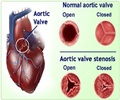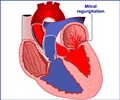The UK is poorly prepared for the forthcoming epidemic of degenerative valvular heart disease, prompted by a rapidly ageing population.

The exact causes of VHD have been poorly researched, but the condition is associated with a great deal of ill health, poor quality of life, and is expensive to treat, say the authors from Oxford’s John Radcliffe Hospital, St Thomas’ Hospital, London, University Hospital of South Manchester, Manchester Academic Health Sciences Centre, and the National Institute for Clinical Outcomes Research.
This is largely because a defective valve is often not picked up until it is too late to treat successfully.
Data from the latest National Adult Cardiac Surgery Database for Great Britain and Northern Ireland show that there has been a sharp increase in all types of valve surgery. But it also shows wide variation in treatment provision.
More than a third of those undergoing surgery to repair their defective mitral or aortic valves had advanced disease, significantly increasing their likelihood of complications, death, and ineffective symptom relief, say the authors.
“These observations suggest that both initial diagnoses and subsequent follow up are currently inadequate and that patients are routinely referred late in the natural history of the condition, beyond the window where surgery is of maximum benefit,” they comment.
Advertisement
“Advancing age is often used to justify the decision to withhold surgery, but suitably selected patients may derive considerable improvement in symptomatic burden and overall quality of life, following successful intervention,” say the authors.
Advertisement
The volume of surgery required to ensure appropriate levels of expertise and good outcomes also leaves much to be desired, they add. Most of the UK centers performing mitral valve replacement/repair undertake fewer than 20 procedures a year: the guidance recommends at least 50 procedures and 25 for each individual surgeon a year.
International guidelines recommend that early mitral valve surgery in patients with few or no symptoms should only be contemplated in specialist units where there’s a 90% chance that a repair will be performed, but this is far from the case, the figures suggest.
The authors call for specialist VHD centres to be set up, staffed by specialists with access to the right screening tests and equipment.
“VHD has been relatively neglected by politicians, health economists and even by cardiologists,” say the authors. “National programmes already exist for heart failure and coronary disease. A similar coordinated approach to research, education, and clinical management is now needed to ensure improved outcomes for all patients with VHD,” they conclude.
Source-BMJ















